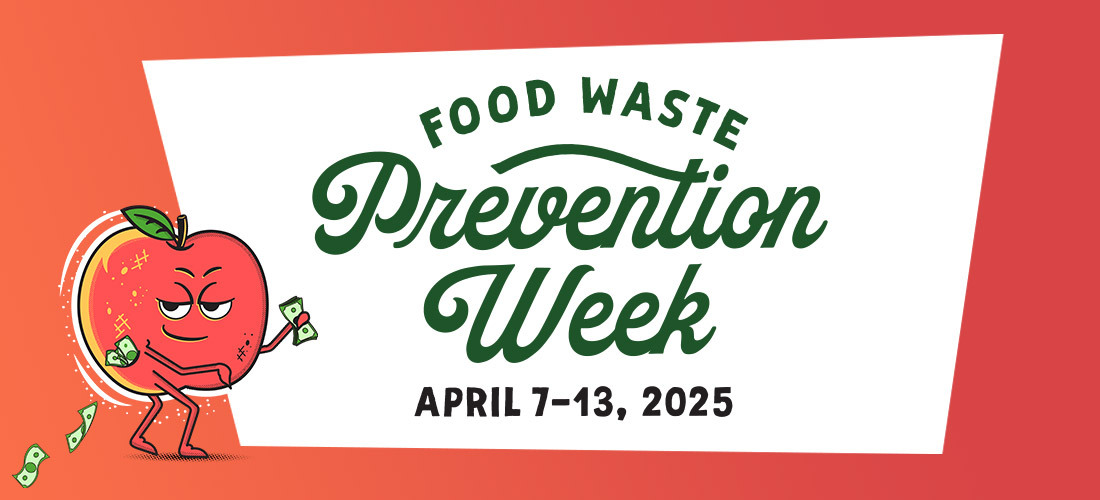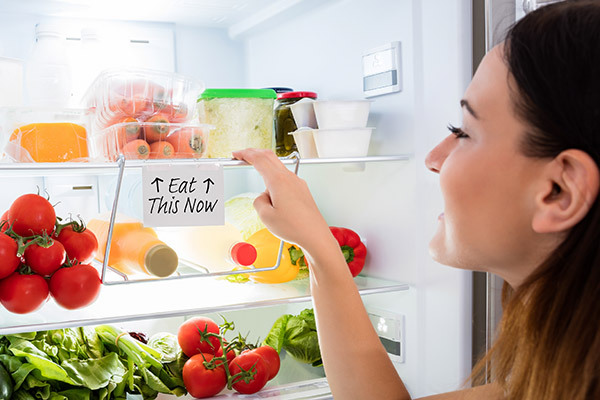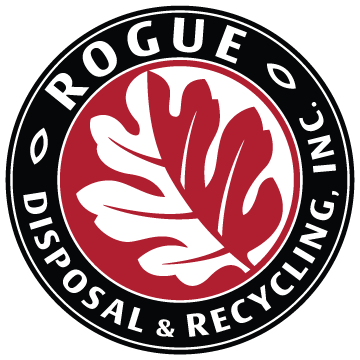Food Waste Prevention Week - April 7-13. Tackling food waste together

How much food do you think is wasted each year? And what impacts does that have? These statistics should give you some food for thought:
- Every year, Americans lose more than $218 billion on wasted food
- The average family of four throws out around $1,500 worth of food each year
- In the United States, approximately 40% of all food grown and produced is never eaten
- Roughly 1 in 5 people in America lack consistent access to nutritious food
Surprised? That’s the idea behind Food Waste Prevention Week —a week-long campaign to raise awareness and inspire everyone to reduce food waste at home, at work and in our communities.
According to the nonprofit Earth.Org, the food wasted by the United States alone each year would provide nearly 130 billion meals. And despite increasing awareness, the problem is growing — with the amount of food waste tripling over the past five decades.
While these big-picture statistics may seem overwhelming, there are simple things you can do every day to help reduce food waste as part of your daily routine. Roughly 37% of all food waste happens at home. That’s right, changes you make in your home kitchen can make a real difference!
Everyday ways you can reduce food waste
The folks at Food Waste Prevention Week have created a comprehensive website, complete with tips, things to do, downloadable resources and more. The goal is to make reducing food waste as easy as possible, giving you the information and easy-to-implement steps you need to incorporate simple changes to your everyday routine.
Stakeholders for this national initiative include everyone from the State of Oregon Department of Environmental Quality and the Washington Department of Ecology to the Food Conservation Alliance, Food Recovery Network, Food Systems Lab, Food Recovery.org, the Natural Resources Defense Council and many more. Nearly 800 regional, state and local organizations across 49 states and 22 countries have all joined together to help move the needle on reducing food waste.
One of the key pages on the Food Waste Prevention Week website is the “Learn” page. Here, you’ll find information on why reducing food waste is so important and ways you can get started.
Learn why food waste prevention is so important:
- It saves money — A typical family of four can save an average of $1500 per year
- It conserves resources — Land, water, energy and human resources are used to grow, package and transport food
- It improves food security — Safe and nutritious food that is currently thrown away could be used to feed those facing food insecurity
Discover what you can do:
- At home
- At the grocery store
- At work

One of many links you’ll find is Savethefood.com. This in-depth food waste resource has a variety of interactive tools:
- Try the guest-imator: A dinner party calculator that estimates how much food you need to keep your guests happy and healthy. Just tell it who’s coming to dinner and find out exactly how much to make.
- Meal prep mate: Create custom meal plans and perfectly portioned shopping lists that help you kick food waste to the curb.
- Practice smarter planning: Not sure where to start? A good plan is often the easiest and most impactful. Try out a collection of prep and storage tools or browse handy tips to become a food waste warrior.
- Whip up new recipes. Give scraps and “past-its-prime” food a new and delicious second life! Learn how to cook with everything from cilantro stems to that overripe avocado on the counter.
- Become a storage pro: When you store food correctly, it last longer — like keeping asparagus in a vase like you would with flowers, for example. This interactive storage guide has all the info you need to keep food fresh.
- Learn what food waste really costs: It costs labor, resources, time, and at the end of the day, money. A 4-person family can lose at least $1,500 a year on wasted food.
And that’s just one of dozens of links. You’ll also find webinars to join, resources to download, and an in-depth blog post about preventing wasted food, written by experts from the Natural Resources Defense Fund:
Downloadable Resources: Click on any of the 10+ links to go directly to a printable, downloadable resource. This is your gateway to resources including Food Waste 101: Understanding the Basics, the USDA’s FoodKeeper app, the EPA Waste Food Scale, and Home Food Preservation from our own Oregon State University Extension.
Expert Blog: Preventing Wasted Food Across the Food Chain: This well-researched article breaks down food waste by category (residential, retail and food service, farms, and manufacturing) and provides side-by-side problems and solutions to the challenge of waste food in each of these sectors. Read the blog post here.
Resources for K-12 Schools: Looking for creative, impactful ways to get your students involved in Food Waste Prevention Week? How-to ideas galore, including entering an art contest, holding a school food waste audit, taking an online pledge and more are all right here, along with in-class curriculum and food waste resources.
Resources for College Campuses: If you’re interested in getting your school involved in Food Waste Prevention Week, the site provides several ways to help educate and inspire everyone on campus. Register as a partner and explore the ways to get involved here.
Local heroes fighting food waste
We're fortunate to have dedicated organizations in Southern Oregon working hard to reduce food waste. Discover these valuable local resources and how they're making a positive impact:
- Southern Oregon Food Solutions: This organization is committed to reducing food waste and its impact on our environment. They provide education and support to help our community close the gaps in the food cycle. Visit their website to learn more and get involved.
- Rogue Valley Food System Network: This network focuses on building a strong and sustainable food system in the Rogue Valley. They bring together community members and organizations to support local farmers and ensure access to healthy food. Visit their website to learn more about what they do and explore their resources.
To learn more about Food Waste Prevention Week, visit the website.
Share This
